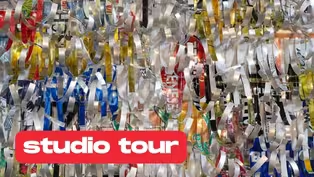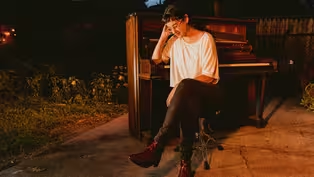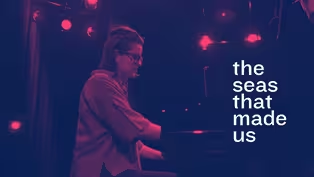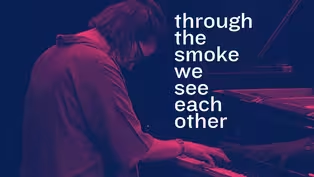
Community Power Structures; Neoclassical and Ambient Sounds
Season 9 Episode 2 | 27m 45sVideo has Closed Captions
Christina Hunt Wood explores the power structures of her community; Sohpia Subbayya Vastek
Christina Hunt Wood explores the power structures of her Northern Catskills community; Sohpia Subbayya Vastek is a pianist and composer based in Troy
Problems playing video? | Closed Captioning Feedback
Problems playing video? | Closed Captioning Feedback
AHA! A House for Arts is a local public television program presented by WMHT
Support provided by M&T Bank, the Leo Cox Beach Philanthropic Foundation, and is also provided by contributors to the WMHT Venture Fund including Chet and Karen Opalka, Robert & Doris...

Community Power Structures; Neoclassical and Ambient Sounds
Season 9 Episode 2 | 27m 45sVideo has Closed Captions
Christina Hunt Wood explores the power structures of her Northern Catskills community; Sohpia Subbayya Vastek is a pianist and composer based in Troy
Problems playing video? | Closed Captioning Feedback
How to Watch AHA! A House for Arts
AHA! A House for Arts is available to stream on pbs.org and the free PBS App, available on iPhone, Apple TV, Android TV, Android smartphones, Amazon Fire TV, Amazon Fire Tablet, Roku, Samsung Smart TV, and Vizio.
Providing Support for PBS.org
Learn Moreabout PBS online sponsorship(upbeat music) - [Matt] Explore the power structure of rural upstate New York through the art of Christina Hunt Wood.
Pianist and composer, Sophia Subbayya Vastek, discusses her career and she performs some of her own compositions.
It's all ahead on this episode of "AHA!
The House for Arts".
- [Narrator] Funding for AHA!
has been provided by your contribution and by contributions to the WMHT Venture Fund.
Contributors include the Leo Cox Beach Philanthropic Foundation, Chet and Karen Opalka.
Robert and Doris Fischer Malesardi.
And the Robison Family Foundation.
- At M&T Bank, we understand that the vitality of our communities is crucial to our continued success.
That's why we take an active role in our community.
M&T Bank is pleased to support WMHT programming that highlights the arts and we invite you to do the same.
(upbeat music) (upbeat music continues) - Hi, I'm Matt Rogowicz, in for Jade Warrick, and this is "AHA!
A House for Arts."
A place for all things creative.
Today we're heading down to Delhi, New York, where I met up with artist Christina Hunt Wood to search for discarded soda cans.
Why would I do that?
Take a look.
(gentle music) - We are gonna go down to the straightaway near the covered bridge to go pick up some beer cans.
To harvest some beer cans, as I call it.
(gentle music) I'm a multimedia artist.
I'm working in video, I work in photography, I work in beer cans.
Right here.
We found one.
(gentle music) I live in Delhi, New York, which is in Delaware County.
And it is very rural.
We're in the northern part of the Catskills.
It's beautiful.
It's like one of the most beautiful places in the world, in my opinion.
I grew up here.
My mother's side of the family is like multi-generational, so I have very deep roots in the area, the White side of my family.
So I'm biracial, African, European-American.
I did not have a lot of, like a very strong relationship with the Black side of my family.
My parents got divorced when I was very young.
And so I was raised in this White space with my very White family and always trying to fit in as like, one of the only Black kids in school.
People were very welcoming.
People were generally kind.
People were also racist.
Being called the N word in the grocery store by another kid, or overhearing somebody calling my mother a name.
But there were also like these microaggressions that were occurring all the time, and I don't, and we just didn't have the language for it as a culture, I think.
But also I didn't have the language or the knowledge that this was something that was bigger than just me, kind of experiencing something that was "normal", until I was much older.
Living in this rural space, watching politics sort of shift in like 2015.
And like the way people were acting out to sort of protect their own personal interest was like shifting, right?
I started seeing people in my neighborhood and in this area erecting Confederate flags and hanging them off the backs of their trucks and like off barns.
And I was just horrified.
And it was like, as somebody who is a minority in this very White space, was like, "Oh my God.
Like, I think something is really shifting, you know?"
We've always had our racism, but like something's fortifying with this, with them.
And so I would talk to friends, my White friends, and White family members and would often get the response, "At least we know who the jerks are.
You know, it's freedom of speech, Christina.
Like, people are allowed to say whatever they want."
And I was probably more horrified by those responses than I was by the actual flags.
Because it just was so dismissive.
And I was just so angry because I was frightened for myself, for people who look like me, people who come to this area that I love very much.
Like I'm deeply in love with my community.
I'm deeply in love with this place.
I'm not going to just leave.
I'm going to try to do good while I'm on this planet and be a part of my community and perhaps challenge them sometimes because I care very deeply about our future.
I started to think about what kinds of objects would represent place, this place.
Rural, but also problematic, beautiful, all of these things.
And so I'm walking along and I'm like, "Ah!
It's the beer cans!
And the road sodas!"
This is the way I describe it.
And I know these guys, so I'm not even just making this up.
Like I know that this is what happens.
Guys get outta work and they're driving home and they're like, "Nobody's gonna tell me I can't have a beer on my way home from work.
I worked hard today."
And so they have their beer, they chuck the beer cans out the window so that if they get pulled over, there's no evidence, or if they've got like a spouse that might question their behaviors, there's no evidence.
And so, a lot of the back roads in this area are littered with these emptied beer cans.
I cut the tops off.
Basically deconstruct them so the tops and the bottoms are off and they just become these like curled pieces of aluminum.
And then I soak them in a bath to decontaminate them.
If they're smaller pieces, I then hand cut each piece.
Larger pieces, I have employed the wonderful paper shredder that I purchased, and it's great.
So they become like these like long strips of fringe and then I glue them to a surface.
And I just kind of build from the bottom and do layers up.
So it's like this very fringy, curled, fringe finished product.
(upbeat music) People love them.
They absolutely love them.
They're sparkly, they're poignant.
I think the beauty of sparkly things draws people in.
And as people are interacting with the piece, they're like, "Oh, this is a bigger conversation."
It's like a gentle way to kind of approach a topic that can be uncomfortable.
So the way I see it is that these cans are acting as microaggressions against the environment, but like it's symbolic of microaggressions towards people.
There is this culture of power over place that I think that White, local, rural people have.
And to me, tossing road sodas is an expression of that power or that desire for the power over place.
Kind of commanding, like, "This is my space to do as I want."
And we all do it, right?
Like, so I'm saying this about my local community because it's the community that I know the best.
But like every group of people in the world does this to some extent.
So I try to get people to think about that.
And how it's related to their own personal experiences and reflect on themselves.
That's the main goal, is that I'm making work that resonates with people and helps people sort of understand how they interact in the world.
- Sophia Subbayya Vastek is a pianist and composer based in Troy, New York.
Her compositions are rooted in classical technique, yet explore neoclassical and ambient inspired sounds.
She's also the co-founder of a nonprofit called Organ Colossal.
So what inspired Sophia to devote her life to music?
Let's find out.
So how did your musical journey begin?
- Well, to take it way back, I was actually born to two professional pianists.
Both of my parents growing up were pianists, which is kind of unusual.
We had two pianos, I guess one for the both of them in the house.
And honestly, my earliest memories are there was a piano.
And I was playing it.
So I think I like to tell people, I've been playing my whole life, and I think that's like genuinely true.
- That sounds amazing.
- Yeah.
- I mean, I can imagine, like, to me that sounds amazing.
I can imagine a lot of people would be like, "Oh my gosh, I need some quiet, peace and quiet."
But I would love that atmosphere.
So you took to it?
- Yeah, I actually, there was a point when my parents realized that I was playing on my own.
I was already reading music.
And I think some combination of them realizing that and me asking for lessons, they were like, "Okay, we should probably give this girl some piano lessons."
But they were very adamant.
They never taught me.
I think that would've been a bad situation.
So we kept it very separate.
I always had other teachers and it just kinda, kept rolling that way.
- And what is it about the piano that attracted you to it?
- That's a great question.
It has such a sense memory for me, just hearing it all the time growing up.
So it's a very, it's a comforting sound for me.
Anytime I'm around it, or I'm hearing it, someone else playing it, I'm just like, "Ugh".
Piano just feels good in my body.
And then also just like the actual instrument itself.
It's like this giant piece of furniture that is just, it has so much power in it.
I love that I can do so much with it.
I can get this huge dynamic range.
I can get so many different kinds of sounds out of it.
It's just, it's a really special, exciting instrument.
And I feel like I'll be exploring it for the rest of my life, you know?
- It's the best instrument.
- It is the best instrument.
- So did you have any favorite composers?
- Growing up?
- Yeah.
- Yeah.
I think I was kind of a strange kid.
But I remember very specifically, I had a teacher in high school who introduced me to Szymanowski, who was this Polish composer, kind of French influences.
Right at the cusp of like, romantic and contemporary music and just really started pushing the language of music.
And I remember playing that composer and just being like, "Wow, there is just this whole other musical world, besides the kind of early classical stuff that I've been playing."
And this is an early compo.
We're talking early 20th century.
Nothing crazy.
But just in my impressionable mind, I was like, "Wow, this is really cool."
And it set me down this path, I think, of contemporary music, and getting more and more present with the music that I was playing.
- So what made you decide to kind of say, "I'm gonna do this as a career?"
- I guess it was really like, when it comes down to it, in high school, when you have to decide what to go to college for.
I was kind of toying around with the idea of doing something else, something either math or engineering based, but really, I don't know, there, at a certain point I was like, "There's no decision here.
Like, I'm a musician.
I wanna audition for music schools."
And it's just kind of, that's been the path.
- And you compose.
So can you describe your music for us a little bit?
- Yeah.
Composing was actually something that came a little bit later.
In classical music, it's kind of this weird dichotomy between people who write music and people who perform music, and that's changing a lot.
But all growing up, all of my studies, it actually was never encouraged for me to even try composing, which I have some anger about, a little bit, you know.
But at a certain point in the last, let's say five years or so, I was like, there's something missing in my craft, in what I'm doing.
And I realized that it was that I needed to write my own music.
And as soon as I started doing that, the floodgates opened.
I would describe my music as, well, I dislike describing it, but I will do it.
- Thank you.
- I would say, like genre-wise, it's kind of neoclassical, post-classical, it's classical adjacent.
But a lot of the kind of formal rules, that sort of thing, I just like don't care about, I don't notate my music.
Like, I don't let other people play my music.
It's just for me to perform.
Not that that won't change maybe someday.
But I'm not a composer in the sense that I'm writing for other ensembles, if that makes sense.
- Okay.
Well, I'm excited to hear you play in a little bit.
But first I understand that you are the co-founder of a nonprofit called Organ Colossal.
Tell us about that.
- Yeah, so my husband and I founded it in 2019.
It's a really small organization.
But we produce and present musical projects, concerts.
We did the Lift Series in collaboration with the Troy Music Hall, which I believe is coming back this coming season.
And we have a really exciting project coming up on October 14th with the music hall, called "KaleidoScape."
I won't say too much about it.
But it's gonna have a lot of musicians from the area involved, which we're very excited about.
- And what kind of music does the Lift Series present?
- Actually, it's a really big range.
I think the, I guess the thread, the thing that we're really interested in, is musicians who are kind of working in between genres.
So yeah, but it's, I think the thing with that series is really the experience of it.
So you're sitting on stage with the musicians.
You're kind of coming through the wings of the music hall.
So it's just, you're just seeing the music hall in a slightly different way, and it just, it feels special, you know?
- That's awesome.
So where do you see yourself in 10 years or so?
What's your kind of artistic goal?
- I love and hate that question.
It's.. (Sophia laughing) So yeah, I have a lot of kind of very specific career goals, like albums that I'm working on and wanna release.
Touring ideas that I wanna pursue.
I think really though, when it kind of boils down to it, the goals are kind of fickle things.
Like, you get there, and then there's the next goal already, and they've overlapped.
And it's really this continuum, right?
And I think for me, especially, I've really needed to figure out how to exist in that continuum so that I'm not constantly let down by reaching that goal, if that makes any sense?
But also kind of holistically, I think I'm chasing this sustainability in my life.
So that means financially, being really smart about that.
But also creatively and emotionally, it's really hard to be a musician professionally.
And so, it just, again, another continuum of constantly tweaking and figuring out the things that I wanna be doing in my life and how to get to those.
And it's just, it's constantly shifting.
- Well, thank you so much for joining me today on AHA!, Sophia, I can't wait to hear you play.
- Thank you.
Thanks for having me.
(piano music) (piano music continues) (piano music continues) (piano music continues) (piano music continues) (piano music continues) (piano music continues) (piano music continues) (piano music continues) (piano music continues) (piano music continues) (piano music continues) (piano music continues) (piano music continues) (piano music continues) (piano music continues) (piano music continues) (piano music continues) (piano music continues) (piano music continues) (piano music continues) (piano music continues) (piano music continues) (piano music continues) (piano music continues) (piano music continues) (piano music continues) (piano music continues) (piano music continues) (piano music continues) (piano music continues) (piano music continues) (piano music continues) (piano music continues) (piano music continues) (piano music continues) (piano music continues) (piano music continues) (piano music continues) (piano music continues) (piano music continues) (piano music continues) (piano music continues) (piano music continues) (piano music continues) (piano music continues) (piano music continues) (piano music continues) (piano music continues) (piano music continues) - Thanks for joining us.
For more arts, visit WMHT.org/AHA.
And be sure to connect with us on social.
I'm Matt Rogowicz.
Thanks for watching.
(upbeat music) (upbeat music continues) (upbeat music continues) - [Narrator] Funding for AHA!
has been provided by your contribution and by contributions to the WMHT Venture Fund.
Contributors include the Leo Cox Beach Philanthropic Foundation, Chet and Karen Opalka.
Robert and Doris Fischer Malesardi.
And the Robison Family Foundation.
- At M&T Bank, we understand that the vitality of our communities is crucial to our continued success.
That's why we take an active role in our community.
M&T Bank is pleased to support WMHT programming that highlights the arts and we invite you to do the same.
Artist Christina Hunt Wood Explores Power Structures
Video has Closed Captions
Clip: S9 Ep2 | 7m 9s | Christina Hunt Wood is an African American artist who grew up in rural Upstate New York. (7m 9s)
Sohpia Subbayya Vastek Composes the Neoclassical
Video has Closed Captions
Clip: S9 Ep2 | 8m 3s | Sohpia Subbayya Vastek is a pianist and composer based in Troy, NY. (8m 3s)
Sophia Subbayya Vastek Performs THE SEAS THAT MADE US
Video has Closed Captions
Clip: S9 Ep2 | 4m 39s | Pianist Sophia Subbayya Vastek performs her original piece, "The Seas That Made Us," (4m 39s)
Sophia Subbayya Vastek |THROUGH THE SMOKE WE SEE EACH OTHER
Video has Closed Captions
Clip: S9 Ep2 | 4m 39s | Sophia Subbayya Vastek performs THROUGH THE SMOKE WE SEE EACH OTHER. (4m 39s)
Providing Support for PBS.org
Learn Moreabout PBS online sponsorship
- Arts and Music
The Best of the Joy of Painting with Bob Ross
A pop icon, Bob Ross offers soothing words of wisdom as he paints captivating landscapes.













Support for PBS provided by:
AHA! A House for Arts is a local public television program presented by WMHT
Support provided by M&T Bank, the Leo Cox Beach Philanthropic Foundation, and is also provided by contributors to the WMHT Venture Fund including Chet and Karen Opalka, Robert & Doris...




